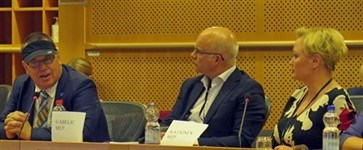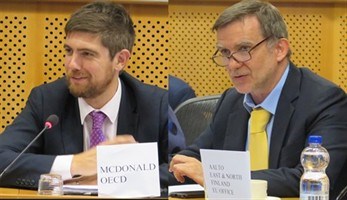Successful NSPA seminar in the European Parliament opened the discussion on the future of Cohesion Policy
On June 19, the NSPA network held a seminar in the European Parliament, hosted by two new MEPs from Finland and Sweden, Elsi Katainen (ALDE) and Aleksander Gabelic (S&D). During the seminar the new proposals from the European Commission for the future of cohesion policy and the potential impact of these proposals on the NSPA regions were discussed.
Elsi Katainen opened the seminar by welcoming the proposal for a new cohesion policy for Europe which will include all regions of the EU. Katainen however expressed her concerns over that the allocation for the NSPA-regions continues to decrease. Katainen noted that the special allocation for the NSPA was cut by almost 13%, more than other parts of the structural funds. Aleksander Gabelic on his part emphasized the importance of learning from best practice of implementation of cohesion policy.

Erik Bergkvist, Regional Councillor of Västerbotten, represented the NSPA regions at the seminar. Bergkvist spoke positively about the proposal that the NSPA regions will continue to benefit from a special allocation, even if it has been reduced. Bergkvist also expressed his appreciation for the proposals to simplify the implementation rules and reporting requirements, and asked the European Parliament and the member States to continue in the same spirit during the upcoming negotiations.
Chris McDonald from the OECD presented the OECD Territorial Review of the NSPA regions which was finalized in 2017, and recommended the EU institutions and the Member States to continue to consider the specificities of the NSPA regions when designing regional and other policies.

Nicola De Michelis, Head of Cabinet for Commissioner Corina Cretu, presented the broad outlines of the European Commission proposal for a new cohesion policy 2021-2027. De Michelis emphasized that cohesion policy will cover all of the EU, and that the Commission has focused a lot on increased flexibility and simplification in the implementation of the cohesion policy.
Constanze Krehl, MEP and one of the main rapporteurs for the new cohesion policy proposals, requested much more attention to visibility of cohesion policy, as its results are largely unknown to citizens. Krehl also urged more attention to be paid to the rural development fund, which has been removed from the cohesion policy family and could be oriented more towards agricultural production. Krehl warned that this might lead to higher expectations on results achieved by the ERDF, despite the decrease in budget for the very same instrument.
The following discussion focused on a range of topic, for example the role of smart specialisation in the next programme period. De Michelis insisted that smart specialisation will continue to occupy a central role in the cohesion policy architecture, even though the concept doesn't feature very prominently in the regulation proposals.
The proposal of the Commission not to include the sparse population criteria in the allocation key for "transition regions" was also discussed. All Finnish regions of the NSPA have been classified as "transistion regions" while the Swedish NSPA regions are classified as "more developed regions". In the allocation criteria for the "more developed regions", the NUTS-3 areas with less than 12.5 inhabitants per square kilometre will continue to get extra support. De Michelis commented that the safeguard clause about no region receiving less as a "transition region" than as they would have as a "more developed region" should assuage all fears that sparse population is not taken seriously.
In conclusion the NSPA seminar started a dialogue about the impact of the new proposals on the NSPA regions, and marked the beginning of the NSPA:s participation in the coming budget negotiations.
